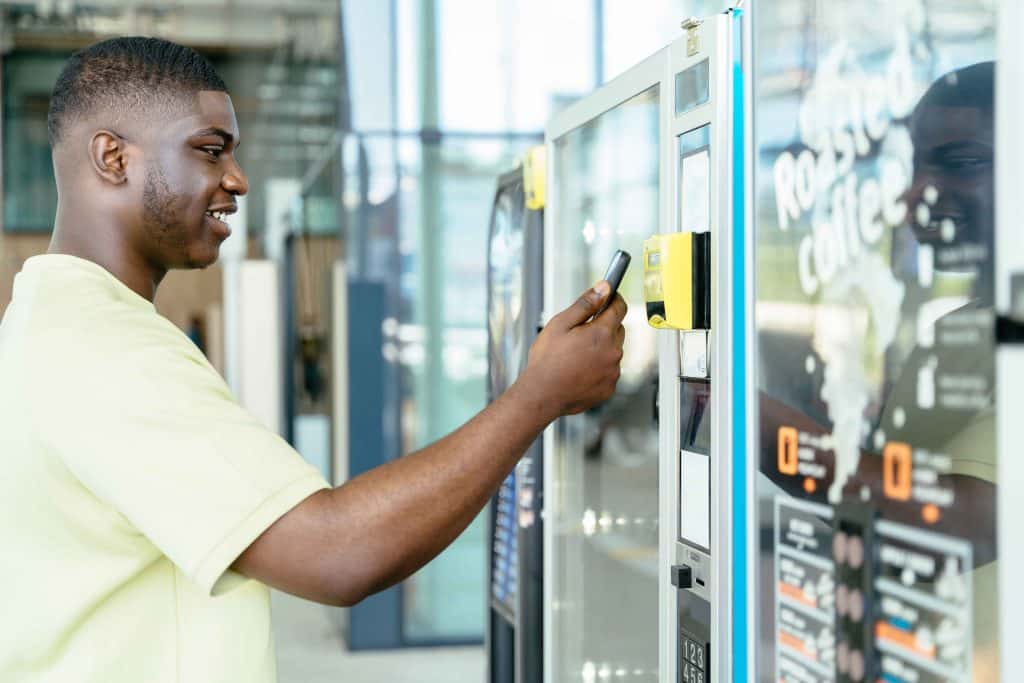What’s next in the realm of vending machine technology? It’s clear that the industry is evolving at a rapid pace, with advancements in software solutions leading the way.
From specialized machines dispensing unique products to sustainable practices and personalized user experiences, the landscape is shifting. But what does the future hold beyond 2025? This evolution provides a tantalizing glimpse into the potential of this often overlooked sector.
Get Free Consultation
Key Takeaways
- Advanced software solutions and user-friendly interfaces are revolutionizing vending machine operations and user experience.
- Environmental sustainability in vending machines is being prioritized through energy efficiency and waste reduction strategies.
- Cybersecurity concerns and hardware upgrades are critical in smart vending machines to ensure data protection and enhanced user experience.
- Sustainable vending practices are being integrated into business strategies to align with consumer preferences and promote corporate social responsibility.
Read more about our Smart Vending Solutions!
Integration of Advanced Software Solutions
The integration of advanced software solutions is revolutionizing the vending machine industry. These cutting-edge technologies are enhancing user experience, providing data analytics and reporting, and offering remote management capabilities.
As we progress into 2025, these trends are expected to dominate the sector and redefine the way vending machines operate.
Enhancing User Experience
Incorporating advanced software solutions significantly enhances the user experience of vending machines, streamlining transactions and boosting customer satisfaction. Whether it’s a mini vending machine, drink vending machine, snack vending machine, vape vending, or mobile vending, each utilizes advanced vending machine software to provide a superior user experience.
Key enhancements include:
- User-friendly interfaces for easier selection and payment.
- Customizable options, allowing users to tailor their transactions.
- Integration with mobile apps for remote access and preordering.
- Real-time inventory tracking, ensuring availability of desired items.
- Advanced security features, increasing trust in vending machine transactions.
These advancements not only make vending machines more appealing, but they also simplify and expedite the vending process, saving users time and enhancing overall satisfaction.

Data Analytics and Reporting
Harnessing the power of data analytics and reporting, advanced software solutions are now transforming how vending machine businesses operate and understand their customers. These tools provide valuable insights, revealing patterns, trends, and associations related to customer behavior and preferences. It’s no longer just about selling a product; it’s about understanding what the customer wants, when they want it, and where.
For instance, software can analyze sales data to identify peak sales times, popular items, and even predict future sales trends. This allows businesses to optimize inventory, improve supply chain efficiency, and enhance profitability. The use of data analytics also supports decision-making, as operators can base their strategies on solid, data-driven evidence. It’s clear that the integration of advanced software solutions is revolutionizing the vending machine industry.
Remote Management Capabilities
Building upon the power of data analytics, advanced software solutions are also introducing remote management capabilities into the vending machine industry. This development is revolutionizing the way vending machine businesses operate, providing higher efficiency and better control.
The benefits include:
- Real-Time Inventory Tracking: Businesses can monitor stock levels remotely, ensuring timely refills.
- Sales Data Analysis: Comprehensive sales data allows for better product placement and pricing.
- Remote Troubleshooting: Many machine issues can be resolved remotely, reducing downtime.
- Cashless Transactions: With mobile and card payments, businesses can track every transaction accurately.
- Energy Management: Businesses can monitor energy consumption, enabling them to reduce costs and environmental impact.
In essence, remote management capabilities are reshaping the vending machine industry, fostering improved operational efficiency and profit margins.
The Rise of Specialized Vending Machines
The landscape of vending machines is seeing a shift towards specialization. Innovative mini vending machines, advanced drink and snack dispensers, and the expansion of vape vending represent this trend. Each offers unique features and functionality, catering to specific customer needs and preferences.
Mini Vending Machine Innovations
In recent years, we’ve seen a surge in the development and use of mini vending machines, especially those designed for specialized purposes. These compact, versatile machines have become a part of our daily lives, offering unique conveniences that were previously unimaginable.
Innovations of such mini vending machines include:
- Customizable Displays: Many machines now feature customizable digital displays, allowing users to easily navigate options and make selections.
- Contactless Payments: NFC technology enables fast and secure contactless payments.
- Energy Efficiency: New designs prioritize lower energy consumption, aligning with global sustainability efforts.
- Smart Inventory Management: Advanced software can track inventory levels and alert suppliers when restocking is needed.
- Unique Product Offerings: From electronics to personal hygiene products, these machines can vend a wide variety of items, far beyond traditional snacks and drinks.

Drink and Snack Vending Machine Advancements
While mini vending machines are making strides in various sectors, an evolution is also happening in the realm of traditional snack and drink vending machines, now offering a more diverse and specialized range of products.
They’re no longer just about serving chips and soda. Instead, they’ve become a hub for exotic snacks, healthy food options, and gourmet drinks. With advancements in technology, machines are now capable of maintaining different temperatures within the same unit, allowing for a wider variety of products. High-tech interfaces make the selection process easier and more interactive.
Moreover, advanced payment methods, including mobile payments and cryptocurrency, are being incorporated. This rise of specialized vending machines is transforming the way consumers interact with self-service food and beverage options.
Expansion of Vape Vending
Specialized vending machines are now expanding into the vaping industry, offering customers a convenient way to purchase vape products. This trend is a testament to the ever-evolving capabilities of vending technology and the growing consumer demand for vaping supplies.
These machines provide several benefits:
- 24/7 Availability: They’re always open, offering around-the-clock access to vaping products.
- Variety: They can stock a wide range of products including e-cigarettes, vape pens, and flavored e-liquids.
- Convenience: Customers can purchase products quickly, without the need to interact with a salesperson.
- Controlled Access: They can be equipped with age verification technology to prevent underage sales.
- Ease of Payment: They often accept various payment methods, including credit/debit cards and mobile payment apps, providing a seamless purchasing process.
Sustainable Practices in Vending
As environmental concerns grow, vending machine manufacturers are adopting sustainable practices in their operations. They’re using eco-friendly materials in machine design and making significant energy efficiency improvements. In addition, they’re implementing waste reduction strategies to further reduce their environmental footprint.
Eco-friendly Materials and Design
In the quest for sustainability, the vending machine industry is turning to eco-friendly materials and design. Manufacturers are realizing the importance of reducing their environmental footprint and turning to innovative, green materials.
- Recycled plastics and metals are being utilized for machine casings, reducing the demand for new, raw materials.
- Biodegradable components, such as corn-based bioplastics, are replacing traditional plastics in some parts.
- Digital interfaces are replacing physical buttons and knobs, cutting down on material use.
- Water-based adhesives and non-toxic paints are being used, reducing harmful emissions.
- Packaging for products within the machines is becoming biodegradable or recyclable, encouraging responsible disposal.
These changes aren’t just good for the planet; they’re also becoming a selling point for consumers who value sustainability.
Energy Efficiency Improvements
While eco-friendly materials are playing a significant role in shaping the future of vending machines, another key trend lies in making these machines more energy efficient. Significant advancements have been made in utilizing technology to reduce energy consumption. Improved insulation, more efficient refrigeration systems, and energy-saving lighting are just a few examples.
| Energy-Saving Features | Purpose | Impact |
| Improved Insulation | Reduces temperature fluctuations | Lowers energy consumption |
| Efficient Refrigeration Systems | Cools products more efficiently | Reduces energy consumption |
| Energy-saving lighting | Uses less power | Decreases electricity usage |
These developments not only make vending machines more sustainable, but also allow for significant cost savings in the long run. The trend towards energy efficiency represents a win-win situation for both the environment and the vending industry.
Waste Reduction Strategies
Shifting our focus to waste reduction, we find that several innovative strategies are being implemented in the vending industry to minimize waste and promote sustainability. Various companies are seeking to make a positive impact on the environment through improved design, operations, and recycling initiatives.
- Companies are installing smart meters to monitor and optimize energy use, reducing waste from power consumption.
- Many are incorporating recycling facilities within their machines, encouraging users to recycle packaging on the spot.
- The use of biodegradable packaging is increasing, which significantly reduces landfill waste.
- The implementation of cashless systems minimizes waste associated with physical cash transactions.
- Lastly, remote stock monitoring is being utilized to prevent overstocking, thereby reducing food waste.
These strategies illustrate the vending industry’s commitment to environmental sustainability.
Consumer Interaction and Personalization
Looking ahead to 2025, the face of consumer interaction with vending machines is set to undergo significant changes. Enhanced touchscreens and interfaces will provide users with superior, customized vending experiences. Furthermore, the integration with smart devices will offer an unprecedented level of personalization, revolutionizing the way consumers interact with these machines.
Touchscreen and Interface Enhancements
The dawn of touchscreen and interface enhancements in vending machines paves the way for improved consumer interaction and personalized experiences. These improvements are not just about aesthetic appeal; they’re designed to make the vending process more intuitive and enjoyable.
- User-friendly touchscreens allow consumers to navigate menus easily and select their items with a simple touch.
- High-resolution screens offer clear, vibrant images that make product selection more enticing.
- Intelligent interfaces remember past purchases, offering personalized recommendations based on user history.
- Touchscreens can display nutritional information, ingredients, and allergens, supporting informed choices.
- Interactive screens can offer promotions, deals, and loyalty rewards, encouraging repeat usage.
These advancements in vending machine technology are setting new standards for convenience and customer engagement.

Customized Vending Experiences
As vending machine technology evolves, it’s now offering consumers a more personalized and interactive experience. Companies are leveraging advanced algorithms and data analytics to provide customized vending experiences.
These machines are learning consumers’ purchase history and preferences to provide tailored suggestions, improving customer satisfaction. For instance, if a user frequently buys a certain type of snack, the machine may suggest similar or complementary items during their next visit. This personalization extends to payment methods too.
Modern vending machines are offering a variety of payment options, from traditional coins and bills to digital payments, catering to individual preferences. These advancements are not only driving sales for businesses but are also enhancing the overall consumer experience, making vending machines more user-friendly and efficient.
Integration with Smart Devices
Smart device integration is transforming the vending machine industry, enabling a new level of interaction and personalization for consumers. As this technology evolves, it’s reshaping how consumers interact with vending machines, making the purchasing process more convenient and enjoyable.
Integration with smart devices offers:
- Mobile payment options, eliminating the need for cash or cards.
- Personalized recommendations based on user’s preferences and purchase history.
- Remote inventory management for vending machine operators.
- Real-time alerts for machine servicing or restocking.
- Promotion of healthier choices through nutritional information display.
Smart device integration isn’t just a trend, it’s the future of vending machine technology. It’s redefining consumer interaction, making vending machines more than just automated dispensers, but personalized shopping experiences.
Future Projections and Potential Disruptions
As we look toward the future, emerging technologies are set to upend the vending machine industry in unpredictable ways. Potential market shifts could create both challenges and opportunities for businesses in this sector. It’s crucial for stakeholders to anticipate these changes and adapt their strategies accordingly.
Emerging Technologies
In 2025, we’re likely to see a significant surge in the implementation of cutting-edge technologies in the vending machine industry. The landscape of vending services is expected to be transformed, with the advent of technologies that offer more convenience, efficiency, and personalization to consumers.
- Artificial Intelligence (AI): AI will enable smart product recommendations based on consumer behavior and preferences.
- Machine Learning (ML): ML will allow vending machines to learn and adapt to consumer habits over time.
- Internet of Things (IoT): IoT will facilitate real-time inventory tracking and predictive maintenance.
- Biometric Verification: This will enhance security, preventing unauthorized access and fraud.
- Cashless Payments: With the rise of digital wallets and contactless cards, cashless transactions will become the norm.
Potential Market Shifts
In the vast landscape of vending machine technology, seismic shifts are on the horizon, potentially disrupting the market as we know it. The integration of AI, IoT, and mobile payments could transform consumer interactions, creating new business models and revenue streams. This shift might also challenge traditional retail, blurring the lines between physical and digital shopping experiences.
| Potential Shift | Implication | Response Strategy |
| AI Integration | Enhanced customization | Invest in AI capabilities |
| IoT Adoption | Real-time inventory management | Develop IoT infrastructure |
| Mobile Payments | Seamless transactions | Adopt mobile payment platforms |
| Digital Shopping | Shift in consumer behavior | Create digital-physical hybrid models |
| New Business Models | Revenue diversification | Explore innovative models |
Market players must proactively navigate these shifts to stay competitive in the evolving vending machine landscape.
Challenges and Opportunities
While these upcoming shifts hold promise, they also unveil a set of challenges and opportunities that could shape the future of vending machine technology. As the sector evolves, industry players should anticipate and proactively address these potential disruptions.
- Cybersecurity Threats: As vending machines get smarter, they become more vulnerable to cyber attacks. Companies must invest heavily in security protocols.
- Hardware Upgrades: Older machines may not support the latest technology, necessitating costly upgrades.
- Regulatory Compliance: With the advent of smart vending machines, regulatory issues around data privacy and security may arise.
- Consumer Acceptance: Companies need to educate consumers about the benefits of smart vending machines to drive adoption.
- Sustainability Concerns: As companies innovate, they should also consider the environmental impact of their vending machines and work towards sustainability.
Protect your vending technology from cyber threats. Read more!
Conclusion
As we teeter on the brink of 2025, vending machine technology stands poised for exciting transformations. The juxtaposition of advanced software solutions with specialized, sustainable machines paints a bright future, further intensified by a surge in consumer interaction and personalization.
Yet, as we embrace this thrilling evolution, potential disruptions lurk, reminding us of the inherent unpredictability of technology. We stand, therefore, not at a destination, but on the precipice of a journey into the uncharted territories of vending machine technology.
Vending Solutions
With our smart vending solutions, grab-and-go shopping gets simpler, faster, and more personalized.
Frequently Asked Questions
How Will the Increasing Use of Digital Currencies Impact Vending Machine Transactions in 2025?
In 2025, digital currencies’ rise will significantly impact vending machine transactions. They’ll likely be quicker, more secure, and more convenient, as users won’t need physical cash, just their digital wallets.
What Are the Potential Health and Safety Concerns Associated With the Use of Specialized Vending Machines?
They’re worried about food contamination, machine malfunctions causing injury, and the hygiene of touch screens. Additionally, there’s concern about vending machines replacing human jobs, causing significant societal impacts.
Are There Plans to Develop Vending Machines That Can Cater to People With Specific Dietary Needs or Allergies?
Yes, there’s a growing trend towards developing specialized vending machines. They’re working on models that consider specific dietary needs and allergies to ensure everyone can safely enjoy their services. It’s a promising move forward.
How Will the Integration of Iot and AI in Vending Machines Affect the Job Market?
They’re predicting that integrating IoT and AI into vending machines could potentially reduce jobs in retail. However, it’s also seen as creating new jobs in technology, maintenance, and filling these advanced machines.
What Kind of Training Will Be Required for Maintenance Personnel to Service Advanced Vending Machines?
With 75% of jobs requiring tech skills in 2025, maintenance personnel will need advanced training in IoT, AI, and robotics. They’ll learn advanced diagnostics, troubleshooting, and repair for these sophisticated vending machines.

